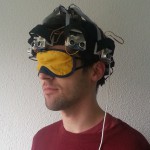
The increasing complexity of processes leads to an enormous amount of data which needs to be processed and understood by people. This is true for a great variability of processes, such as a production process in a factory or a more abstract procedure settled in an office environment. Finding a suitable way to visualize the more…

RüttelFlug is a sensory augmentation wearable for paragliders. The intelligent wristband measures vertical speed of the pilot and converts it into intuitively differentiable vibration patterns. As tactile perception is used for information transmission, the pilot can use his other senses, such as the eyes and ears, for experiencing flying. The key to flying more…

Over several years, the KIT-FM (Facility Management) has collected data with immense value for the operational management, but also for the planning and implementation of future infrastructure developments. This data has been collected in a widely closed real system and is available for nearly all buildings on the Campus North (former research center) containing a more…

Lowering the energy consumption has become a prime goal for most, if not all, system developers and engineers working nowadays in building smart environments, consorting that way with the today’s world’s climate and energy policy. A smart environment like a smart home should therefore be able to provide energy efficient solutions and services. This should more…

Within the BMBF-funded project “Lehre hoch Forschung”, several measures to establish research-oriented teaching at a much earlier stage than in traditional university teaching are implemented at KIT – both in individual institutes as well as in the central institutions. TECO / the Chair for Pervasive Computing Systems is involved in the more…

Germany has a leading position in the development of mechatronic systems. However, manufacturers often face the following contradiction: on the one hand they themselves manufacture high-tech for the production of tomorrow and on the other hand due to the high diversity in their own production they become fragmented with to manual processes. The lack of more…

ProximityHat is a wearable sensory substitution system, which uses pressure actuators around the head to convey spatial information. It was already shown that the sense of touch can be used to augment our perception of reality. Existing systems focus on vibration signals for information transfer, but this is unsuitable for constant stimulation in everyday use. Our system more…

In order to meet the increasing demands for high resolution and high quality environmental data, e.g. in Smart City scenarios, new approaches for sensing systems have to be considered. One alternative for using few professional measuring stations consists in crowdsourcing the data collection – Participatory Sensing. Data is collected highly distributed with mobile and inexpensive more…

The ubiquity of mobile networks and smartphones in principle offers an excellent infrastructure for participatory environmental measurements, e.g. in Smart City scenarios. Modern smartphones are already equipped with a variety of internal sensors. In some current models, even environmental sensors for measuring temperature, humidity and air pressure can be found. However, phenomena such as the more…

In this project, we develop a tool chain based on In-Memory Data Management and Parallel Data Processing in GPU using CUDA for large and intensive Smart Meter analytics.














